Now, before we get started, allow me to be clear: grimdark is great! It has its place in the fantasy spectrum, and many works that fall under the grimdark or gritty heading are classics. Obviously, we here at Tor.com love our Abercrombie and Martin—which, really, they need to also be a vaudeville team—but sometimes we want a fantasy that’s more optimistic. Just a little, guys! C’mon, we’re not asking for much…
The Goblin Emperor—Katherine Addison
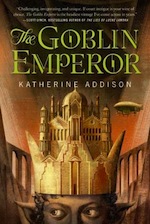
Katherine Addison’s delightful novel is about many things, but at its (lovable) heart it’s a story about realizing that sometimes your quirks are your greatest strengths. Maia, half-elven, half-goblin, becomes Emperor when his father and three elder brothers are assassinated. He has to learn how to rule a distrustful kingdom while he investigates the murder, navigates the byzantine politics of his (primarily Elven) court, and, hardest of all, stays true to himself. The story doesn’t shy away from the horrors of executions or the ugliness of prejudice, but it also focuses on the power of compassion to bridge social differences and effect change.
The Face in the Frost—John Bellairs
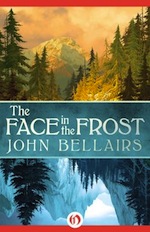
A wizard named Prospero (not that one) teams up with his old friend, the adventurer Roger Bacon (OK, maybe that one), to confront an evil power attacking their kingdom. They know going into the fight that they’re outmatched, but what else can they do? Bellairs’ story, like all of his work, juggles truly effective horror with quirky humor. The book gives weight to both elements, owning up to the terror that would come with a fight against evil, but also never wallowing in that terror to the point of overwhelming the humanity of the book.
The Copper Promise—Jen Williams
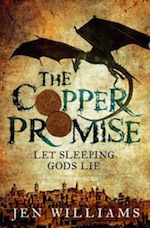
Williams’ novel combines some of the tropes of grimdark, e.g. mercenaries, torture, and tragic backstories, with some of the higher ideals of sword and sorcery. Best of all, it treats what could have been a slog through brutal battles as a lighthearted adventure. This bright tone, combined with a biting sense of humor, make the book fun as well as epic. The fallen knight is more complicated than we think, the swordswoman-for-hire is as handy with snark as she is with a sword, and… what’s this? The main character’s arc is one of rediscovering his humanity after a horrible trauma, rather than a slow degradation into despair? Is it possible?
Riftwar Series—Raymond E. Feist
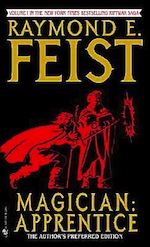
Several denizens of Twitter suggested Feist’s work as an antidote to grit! The central conceit of the Riftwar books are the rifts themselves—they can join worlds, but those who travel through them can seek communication and exploration, or war and conquest, and the series explores many permutations of these choices. Sure, it has has war right there in the name, but it also has characters who are willing to sacrifice themselves for the greater good, who take chances on trusting each other (and have that trust rewarded), rulers who choose mercy over murder, and candidates for the throne who abdicate so that better people can lead. We’re a long way from Westeros when we’re reading Feist.
Shannara Series—Terry Brooks
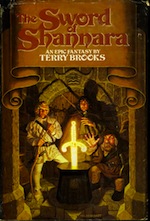
These are more high fantasy style, involving hero quests in addition to mundane acts of heroism. As he says in his 2003 book Sometimes the Magic Works, his “protagonists are cut from the same bolt of cloth as Bilbo and Frodo Baggins. It was Tolkien’s genius to reinvent the traditional epic fantasy by making the central character neither God nor hero, but a simple man in search of a way to do the right thing….I was impressed enough by how it had changed the face of epic fantasy that I never gave a second thought to not using it as the cornerstone of my own writing.“
Chrestomanci Series—Diana Wynne Jones.
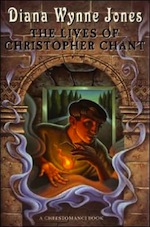
All of Diana Wynne Jones’ books could be on this list, but we’ll stick with the Chrestomanci Series, and particularly, The Lives of Christopher Chant. People die, parents split up, and villainous uncles trick nephews into nefarious schemes, but Wynne Jones still gives us characters to root for and dashes of hope. Christopher Chant himself is good-hearted (occasionally bitchy, but good-hearted), going out of his way to help a young goddess, and forging a friendship with the awesomely-named Throgmorten the Cat.
The Sun, the Moon, and the Stars—Steven Brust
Brust’s novel is about a painter creating oil paintings and putting an art show together. It’s also a retelling of the Hungarian tale of Taltos, who uses expert-level trickster skills to con the sun, moon, and stars away from the monsters who own them. The stories parallel each other in fascinating ways, but much of the weight is given to the modern story of a person who is part of both an artistic community and a supportive relationship. This allows the book to work as an inspiring tale of the value of art, rather than just another quirky fairytale mashup.
Range of Ghosts—Elizabeth Bear
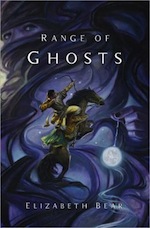 Range of Ghosts, the first book in Bear’s Eternal Sky trilogy, gives us an epic fantasy world influenced by Central Asian culture. Temur, a grandson of the Great Khagan, and Samarkar, the former princess of the Rasa dynasty who abdicated her royalty to become a wizard, must stand together against the hidden cult that has caused civil war throughout the empires of the Celadon Highway. While this is a complex book, with layers of religious tradition and political intrigue, Bear also focuses on the characters at the story’s center, and, as Liz Bourke said in her review, “the significance of a single life, united with other single lives,” and “moments of kindness and stillness amidst the horror of war,” creating an epic with a beating, human heart.
Range of Ghosts, the first book in Bear’s Eternal Sky trilogy, gives us an epic fantasy world influenced by Central Asian culture. Temur, a grandson of the Great Khagan, and Samarkar, the former princess of the Rasa dynasty who abdicated her royalty to become a wizard, must stand together against the hidden cult that has caused civil war throughout the empires of the Celadon Highway. While this is a complex book, with layers of religious tradition and political intrigue, Bear also focuses on the characters at the story’s center, and, as Liz Bourke said in her review, “the significance of a single life, united with other single lives,” and “moments of kindness and stillness amidst the horror of war,” creating an epic with a beating, human heart.
The Dragon’s Path—Daniel Abraham
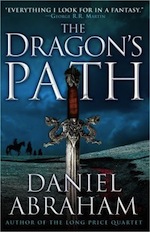
The Dragon’s Path is epic fantasy that picks up after the dragons have gone, leaving behind thirteen races who were bred to serve them. Now those races squabble and war with each other as they try to map an economy and political destiny. While there is a lot of page-time spent on pseudo-Renaissance banking systems, Abraham also takes the time to give us several point-of-view characters that enrich the story with humanity. He chooses to focus on a higher-class couple who would probably be the villains in most books, but here are made worthy of empathy.
Little Big—John Crowley
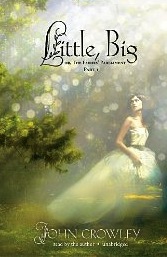
Little, Big unfolds over nearly a century, as the Drinkwater clan builds an intricate relationship with the world of faerie. We meet the human family, hear rumors of magical beings, visit a dystopian City, and spend some time with a Grandfather Trout who might be a cursed prince. Crowley isn’t afraid to slow down and ponder heady subjects like free will and fate, or to tell his story through intricate detail and gorgeous language, which led to a novel that Ursula le Guin said, “…all by itself calls for a redefinition of fantasy,” and Thomas Disch called “the best fantasy novel ever. Period.”
Lyonesse Trilogy—Jack Vance
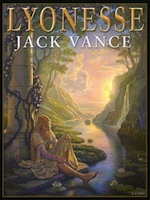
This trilogy melds Arthurian stories, chivalric tropes, and Celtic mythology into a story of a despotic king, his daughter, and her lover. Since Vance took elements from several different medieval periods and used those elements to bring life to his own magical lands, he can play around with references to stories and echoes of themes, such as the fall of Atlantis, without being tied to an expected narrative. While the story itself is not exactly lighthearted, it does feature plenty of humor, fun, and romance. He also uses the Atlantean references to tinge the whole story with melancholy—how long can Lyonesse last? Does the possibility of the Kingdom’s end overshadow the joy that can be had in the moment?
The Innkeeper’s Song—Peter S. Beagle.
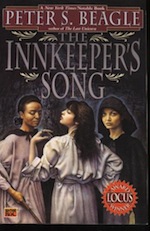
We talk about The Last Unicorn a lot on this site, because The Last Unicorn is fucking awesome. But! Peter S. Beagle did so much more! So when a Twitterer mentioned Beagle’s work, I decided to highlight The Innkeeper’s Song. Beagle jumps across multiple points of view to weave several different quests together. Tikat pursues his childhood love, whom he saw resurrected by magicians. Lal and Nyateneri, the magicians, are racing to save their old mentor from his powerful but evil student. Lukassa, the resurrected girl, has her own path to pursue. And the Innkeeper himself must take them all in, even though he knows they bring trouble with them. Through nested quests and elegant language, Beagle tries to get to the heart of death, love, and duty.
The Curse of Chalion Series—Lois McMaster Bujold
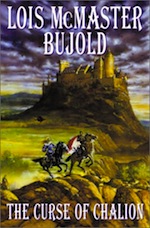
This series is a melding of fantasy and theology informed by elements of medieval Spanish history and mysticism, especially the reign of Ferdinand and Isabella in the late 15th Century. The Curse of Chalion follows Lupe dy Cazaril, who returns home after war and enslavement to try to live a quiet life, but instead finds himself working to lift the curse that lays on the royal family that has acted as his patron. A little bit epic, a little bit slice of (imaginary, alternate universe) life, the series takes questions of morality and duty seriously, without succumbing to endless bouts of violence or despair.
So, this is our list, but we’re sure there are more upbeat fantasies out there—give us your suggestions! Do you want some light to cut through the grimdarkness, or are do you prefer your fantasy as gritty as possible?
This post originally appeared on Tor.com on April 23, 2014.
Leah Schnelbach believes that the grimdarkness of her own personal far future will be averted if she gets to read a sequel to The Goblin Emperor.










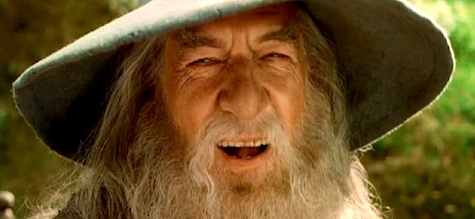
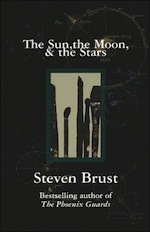
I really like the “Bad Spell In Yurt” books by C. Dale Brittain for a light hearted fantasy book.
-Joe
I am worried exposing people to non-grimdark might lead to smiling and worse, to laughter, which as we all know “is a devilish wind which deforms, uh, the lineaments of the face and makes men look like monkeys.”
That said, perhaps one or two of Pratchett’s books lean somewhat towards humour.
“The 500 Kingdoms” and “Elemental Masters” serieses by Mercedes Lackey. The smart heroines and heroes who win through kindness and brains always cheers me up.
I also like light paranormal mysteries like Leigh Perry’s “Skeleton” series, and both of Victoria Laurie’s psychic mystery series,.
Surprised to not see David Eddings mentioned; he was king of this kind of lighthearted fantasy. Best to dive into the Belgariad and Mallorean.
The second & third book in the Lyonesse series are quite light hearted, but the first one is not a happy book at all.
Thank you for bringing Jack Vance’s Lyonesse trilogy into the light! Vance was truly a master of storytelling and a real-life wizard when it came to prose.
The wizard Shimrod has to be one of my favorite Vance characters, and Dhrun and Glyneth’s escape from the troll (who in typical Vance style is quite capable of intelligent conversation yet still extremely brutal) is a wonderful example of Vance’s knack for characters who overcome horrible situations using nothing but their ingenuity.
Again, thanks for including Lyonesse. It’s a shame that he isn’t a more widely-celebrated author and it’s good to see him being given some of the recognition that he deserves.
James Davis Nicholl: Most if not all of Pratchett’s oeuvre belongs here, I’d say.
I’d also add John Barnes’s One for the Morning Glory, which veers between darkness and whimsy in roughly equal measure. It’s fun, if for no other reason than it’s a fairy tale where the characters are pretty sure they’re in a fairy tale, and so attempt to act accordingly.
Lawrence Watt-Evans Ethshar books are another great example of light-hearted fantasy.
It was good to see someone mention David Eddings Belgariad and Mallorian (and his Elenuim is great too!). Also Katherine Kurtz’s Deryni books. Why oh why are most not in print any more I’ll never know. I was a long time fan of Kurtz and Eddings long before I adventured into Middle Earth. Seriously so many non-GrimDark series that are just plain awesome. May I say for the record I HATE the term GrimDark? Borrowing from the old comic book term Grim & Gritty? Oh well I’m just old and cranky and think the term is silly. Oh, “Kids, get off my lawn!”
Great post!
Yes, Eddings is fun. Just don’t read his Dreamers. I have never been so pissed at the end of a set of books feeling like I wasted my time. Saying more would be a spoiler.
Silk is a favorite rouge of mine.
What I like about this list is, with the exception of Bujold, Brooks, & Fiest, I feel like it is highlighting “lesser known” and / or “newer” authors.
But I could be totally wrong. My overall education in popular fantasies is fairly limited.
“Peter S. Beagle did so much more!”
*ahem * He’s still alive and still writing, y’know. Allow me to fix that for you:
“Peter S. Beagle has done so much more.”
That’s better.
/pedant
Kenny Cross, I was going to share some interesting news re Katherine Kurtz’s Deryni books but only discovered that once again I have confused Katherine Kurtz’s Deryni books with Katharine Kerr’s Deverry books. Bah! They aren’t that similar!
@@@@@ James Davis Nicoll
No they aren’t, but I have done it on more than one occasion when getting what I thought was the next in either series out of the library.
Thanks for the post, I really do not want to read grimdark at the moment and was rather dispairing of finding new to me reading, but there is plenty here.
Thanks for the list: lots of good things to put on Goodreads. But where’s Patricia C. Wrede? You can’t more light-hearted than the Enchanted Forest Chronicles.
I would go with Asprin’s MythAdventures series. It’s full of horrible jokes, ) an apprentice magician (Skeeve), and a depowered demonic mentor (Aahz) trying to teach Skeeve about magic without them both getting killed in the process. For example, Skeeve’s girlfriend is a troll assassin; female trolls in this universe are known as Trollops (but be careful about the usual innuendo around Tananda!)
Anything by Guy Gavriel Kay. Seriously avail yourself of his wonderful writing.
@16 Well… I have to say I didn’t consider Tigana or Under Heaven as particularly lighthearted. Perhaps Under Heaven is a bit more light, but Tigana in particular is rather dark (if also gorgeously written) and left me feeling pretty morose. Seriously, that ending. Of course, he’s written other things that I haven’t had the opportunity to read yet!
@14 ABSOLUTELY. The Enchanted Forest was one of my childhood favorites. Cimorene’s the best princess!
Anyways, more books to put on my to-read list… it’s starting to look rather overwhelming.
What about ER Eddison’s The Worm Ouroboros? Or his Zimiamvian Trilogy? Mistress of Mistresses, A Fish Dinner in Memison and The Mezentian Gate?
Then there is David Lindsay’s A Voyage to Arcturus … one of the best quest stories I’ve yet read …
And what about Jonathan Stroud and the Bartamaeus novels? And Dianna Wynne Jones and Howl’s Moving Castle? Oooh, if I were at home with my bookcase nearby I could go on…
Edit: Gah, forgot to click post last night, so many of these have probably been mentioned.
So if you’re going to consider anything, you really have to mention the authors that Grimdark was bucking against.
There are the big names – David Eddings, Terry Brooks, Raymond Feist, Robert Jordan.
And then there are the midlist greats, some of whom are getting deserved rereads and many who should have more attention.
Mercedes Lackey’s Heralds of Valdemar, L.E Modesitt Jr’s Magic of Recluce and Spellsong Cycle, Janny Wurts Cycle of Fire, Melanie Rawn’s Dragon Prince, Katherine Kurtz’s Deryni, Jennifer Roberson’s Chronicles of the Cheysuli.
Sherri S Tepper has the True Game, Jonathan Wylie did some interesting things in Servants of Ark, and who can forget Roger Zelazny’s Amber series?
Or you could go completely lighthearted, and look at Christopher Stasheff’s Wizard books, Robert Asprin’s Phule series, Lyndon Hardy had Master of the Five Magics and its sequels, or there’s even a newcomer to the british scene, someone named Pratchett?
Tad Williams is probably still a little dark, but there is Diana Paxson’s Chronicles of Westria, and if you can find them, look at Hugh Cook’s extraordinary Chronicles of an Age of Darkness.
Oh and I dearly love Michael Scott Rohan’s Winter of the World trilogy.
I’d like to be able to read the Jen Williams book. But it looks like it’s a UK-only release. :(
I’d add “The Wizard of the Pigeons” and “Brother to Dragons, Companion to Owls”. Serious, but charming.
This is interesting because I think most fantasy is not grimdark, is rather optimistic, and that grimdark is more of a recent phenomenon?
Also the first three Drgaonlance books should easily fit on this list, and perhaps many of the Redwall books.
I recently read the Keith Roberts collection Anita, which gathers together the sequence of stories about a young witch and her cantankerous, proto-Weatherwaxian granny. It’s not without some dark moments but they are leavened by lighter sections where Anita helps a ghost move on, visits the beach and attempts to appear on a television quiz (never think that you know more than a witch about folklore…). Not the kind of thing I expected from the author of Pavane and “Weinachtsabend”.
I just want to say that “The Curse of Chalion” by Bujold is one of my favourite books of all time.
Dear Leah,
I wanted to point you to this Italian web magazine which posted a “creative transaltion” of this piece:
http://www.fantasymagazine.it/notizie/22459/voglia-di-leggere-qualche-fantasy-ottimistico-pe/
The author who signed it is Irene Grazzini. She doensn’t even cite your name.
Jack Vance’s LYONESSE trilogy, which other people have mentioned here, is simply an antidote to everything.
When I want sheer escapism, I will turn to this.
I think, perhaps Vance’s CUGEL’S SAGA is also a nice antidote to grimdark.
So sad to think he will not be writing anything like this again, but I guess we have to be thankful for what we get.
Read *Lyonesse*. Then wonder at the invention and joy of the written word, and how Vance managed – almost as an aside – to write one of fantasy’s most engaging and empowered heroines in *Madouc*. Madouc is not special because of her ‘birthright’, or magic sword, or other plot device – she is special because she exhibits all the characteristics of a young girl, and nothing gets in the way of her tenacity. She will not give up, or give in.
Fool on the Hill by Matt Ruff — while it has its harrowing moments, it’s fundamentally a wonderfully optimistic novel (and at least a minor classic in my book).
The Patricia Wrede books I’d mention in this context would be the “Mairelon” duology — Mairelon the Magician and Magician’s Ward — alt-Regency fantasy with a certain Dickensian sensibility.
Diane Duane’s Young Wizards series, which is essentially designed around the theory that wizards are professional optimists even (and especially) in crisis situations.
Pretty much anything by Sherwood Smith, but in this context I think my specific recommendation would be the series beginning with Coronets and Steel, centered on the tiny European land of Dobrenica.
@Petar You’re absolutely right. I’d love a Vance reread by Tor. Make it happen! Please :)
I’m in the midst of the Fall of Ile-Rein trilogy by Martha Wells (starts with The Wizard Hunters). It’s not high fantasy, but it is excellent and fits well on this list. It starts in a sort-of alternate 19th century Europe with magic and quickly moves into an alternate world. The books are fast paced and full of great characters.
As always, if you’re looking for a wonderful standalone fantasy novel Wells’ Wheel of the Infinite is superb.
I’m also happy to see Elizabeth Bear’s Eternal Sky series and Daniel Abraham’s Dagger and Coin on the list. They are some of my personal favorites from recent years.
I love Bujold’s Chalion series, but I would also recommend her “Sharing Knife” series – four books, set in a frontier society reminiscent of the early US, with a magical menace, and one of the Cutest Couples Ever!